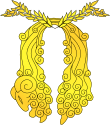Hellenization of Laz people
| Laz people |
|---|
 |
|
|
Hellenisation of Laz people was cultural assimilation of the Laz people into the Ottoman Greek society. conditioned by the different reasons: it could be political, economical and especially religious factors.
Hellenization is the historical spread of Greek culture, religion and, to a lesser extent, language, over foreign peoples conquered by Greeks or brought into their sphere of influence.
Background
After the fall of Constantinople the Ecumenical Patriarchate of Constantinople was established by the Ottoman sultans as the head of the Eastern Orthodox millet, which encompassed all Eastern Orthodox subjects of the Ottoman Empire, regardless of ethnic origin; not only Greeks, but also Bulgarians, Serbs, Albanians, Wallachians, Moldavians, Croatians, Syrians, orthodox Arabs, Georgians and Laz were submitted to the jurisdiction of the Greek-dominated Patriarchate.
This jurisdiction was not only religious, but also had a secular simension, as the Patriarchate and its bishops had control over education of the Orthodox population.
History
Laz people made up the majority of the Trebizond Eyalet's native population. They were a target of the Ottoman Islamization policy and gradually converted to Islam, while part of the people who remained Orthodox were subordinated to the Greek Church, and were thus gradually subjected to Hellenization: the Christian Laz had Greek names and had to study and perform the Greek liturgy. The Laz language was even banished from families as a language of irreligious people. According to Hrachia Adjarian "There are orthodox Lazs who are under the control of the Greek patriarchate in Istanbul. They speak Greek and call themselves Greeks." Lazs who were under the control of Constantinople, soon lost their language and self-identity as they became Greeks and learned Greek, especially the Pontic dialect of Greek language, although native language was preserved by Lazs who had became Muslims.
Nowadays, officially there are not Christian Lazs in Turkey, they are called Greeks although they still remember about their Laz roots.